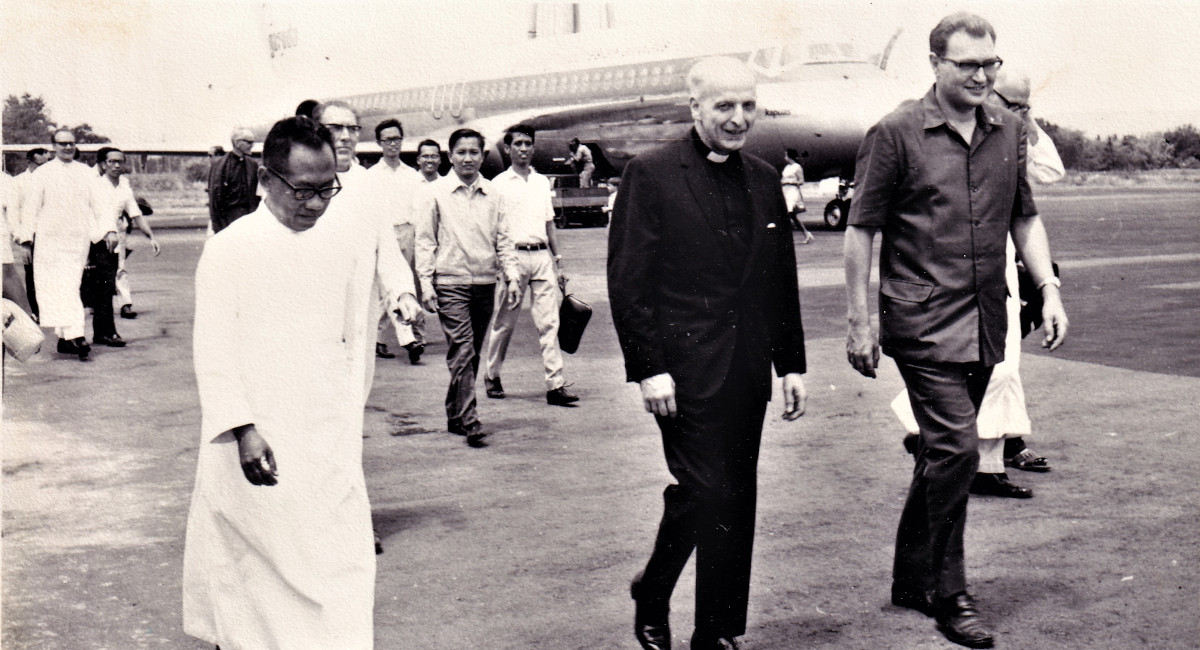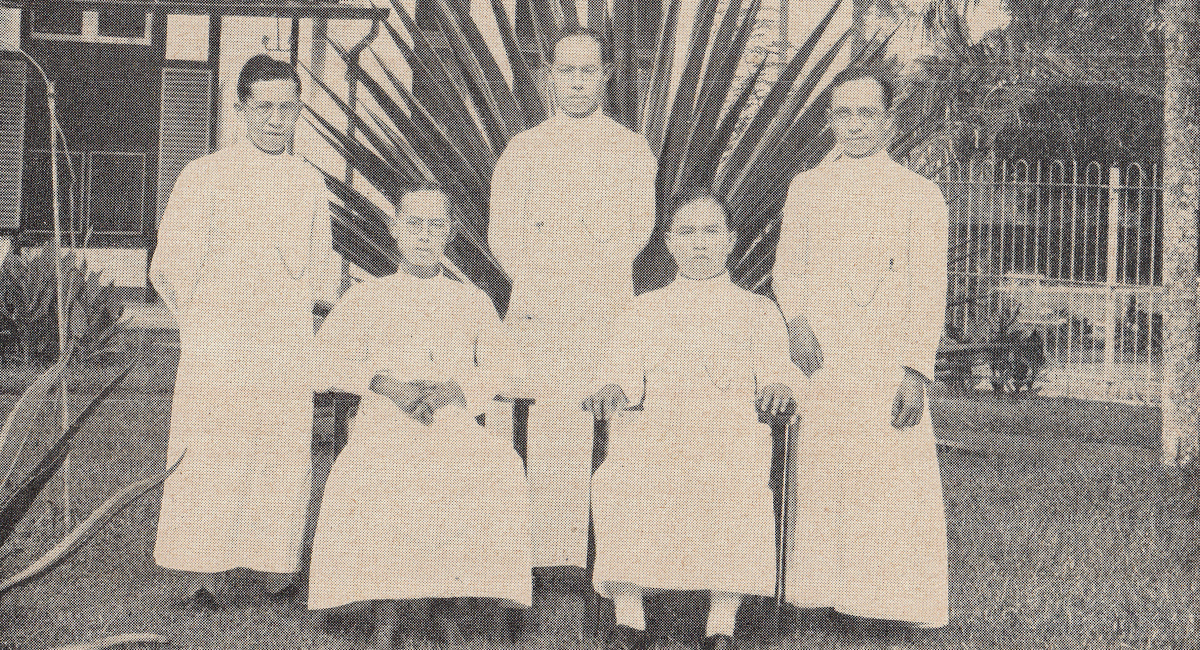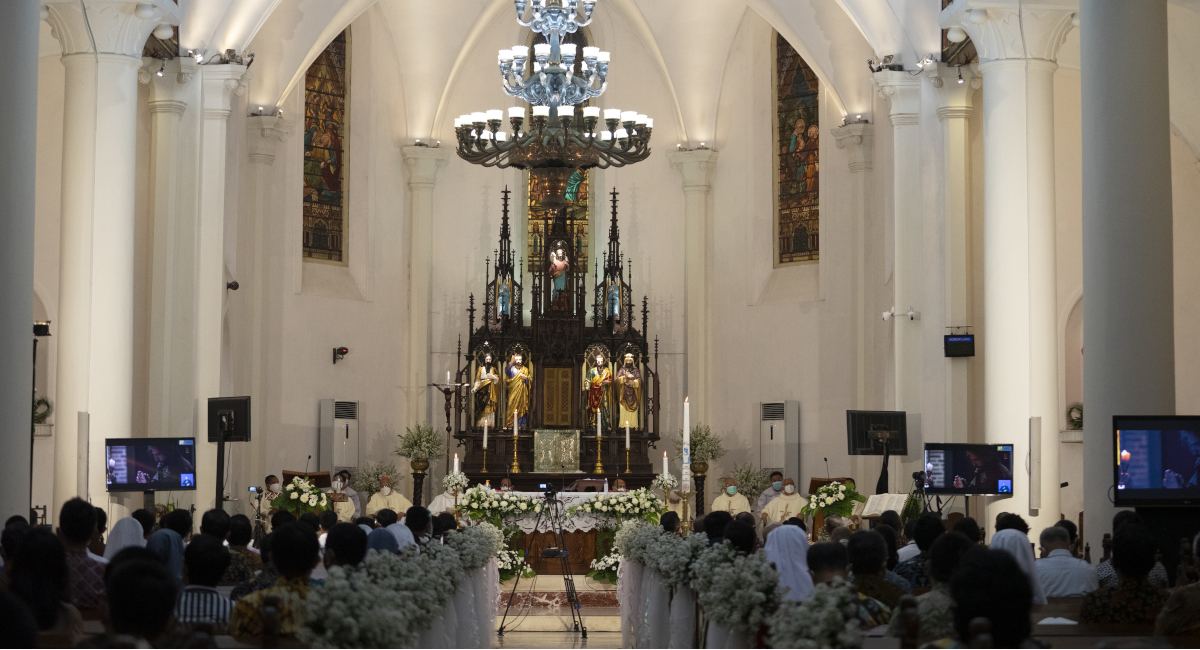
On 8 September 2021, the Jesuits in Indonesia celebrated the 50th anniversary of Indonesia as an independent province of the Society of Jesus.
A thanksgiving Mass was held on 11 September celebrated by Indonesian Provincial, Fr Benedictus Hari Juliawan SJ, with the Vicar General of the Archdiocese of Semarang, Fr YR Edi Purwanto, and the parish priest of St Joseph, Gedangan, Semarang, Fr Benedictus Cahyo Christanto SJ. Former provincials including His Eminence Julius Cardinal Darmaatmadja SJ joined as concelebrant in the church, while Fr Riyo Mursanto SJ joined the celebration online from Manila. Remarkably, the Covid-19 pandemic gave the Jesuits an opportunity to make the thanksgiving Mass more inclusive. Parishioners from Jesuit parishes, and collaborators in the various social and education apostolates contributed to the liturgy through video. The Church of St Joseph in Gedangan, where the Mass was held, is a historic place for the Indonesian Province. It is one of the oldest churches in Central Java and was the residence of Archbishop Albertus Soegijapranata SJ, the first local bishop regarded as one of Indonesia’s national heroes and especially remembered by Javanese Catholics for his contribution during the struggle for Indonesian independence.
The early Java Mission
The presence of the Jesuits in Indonesia can be traced to two key moments in history. The first Jesuit to arrive in Indonesia would become one of the greatest Catholic missionaries since St Paul, the Apostle. St Francis Xavier arrived in Moluccas in 1546 followed by the Spanish and Portuguese Jesuits. (Incidentally, 2022 marks the 400th year since the canonisation of St Francis Xavier.) Thus began the Jesuit mission in eastern Indonesia. For 130 years, the record shows 81 Jesuits working in Moluccas.
The second key moment was the arrival of Dutch missionaries in 1859. They included Fr Martinus van den Elzen and Fr Joannes Baptista Palinckx. Indonesia was known as the Dutch East Indies during the colonial era, and the Jesuit mission held the juridical status of Java Mission. Dutch missionary Fr Franciscus Georgius Josephus van Lith SJ would later be recognised by the Indonesian Ministry of Education for his missionary and educational work in Central Java. The Jesuits had set up the first Catholic school in Muntilan, where students regardless of their religious, cultural, or ethnic background could receive an education. Archbishop Soegijapranata was one of the many prominent Indonesians in the 20th century who trained at the school.

The birth of the Indonesian Province
It was the Dutch missionaries who paved the way for local Indonesian Jesuits, and ultimately, the Indonesian Province. Fr General Jean-Baptiste Janssens in 1956 established Indonesia as an independent vice province of the Netherlands. His successor, Fr General Pedro Arrupe, subsequently established the Indonesian Province on 8 September 1971. Fr Antonius Soenarja SJ who had been in the leadership of the Indonesian Jesuits since 1967 was appointed as the first provincial. The newly established province had 333 Jesuits with 176 local Indonesian Jesuits and 157 missionaries of different nationalities. In his decree establishing the Indonesian Province, Fr Arrupe noted: “Not as in many other places where the number of the members decrease, in Indonesia the members increase of which the majority was born in Indonesia.”
In its early years, the province dealt with identity issues. The tension between local Jesuits and the missionaries culminated in the term, Indonesianisation, in the 1960s. Even as the locals served in more roles in the works of the province, the tension did not easily subside. Fr Woerkens, one of the Dutch missionaries, in 1974 wrote in the Indonesian Jesuits’ internal newsletter, Internos: “The word Indonesianisation is sometimes understood incorrectly, using words like foreign workers, full time employees, and contracted workers. Such words hurt feelings. The polarisation of local and foreign Jesuits should not happen. It hurts the love among the Jesuits. The Church and the Society of Jesus is not a company consisting of local and foreign manpower.”
As the province turned 50, such tension is no longer present. There are not enough foreign missionaries left for it to be an issue. Today only one Dutch and five German missionaries remain. As of 2021, the province has 339 Jesuits, 246 of whom are priests, 74 are scholastics, and 19 are religious brothers. Identity, however, remains a question within the province. Statistically speaking, 90 per cent of the Indonesian Jesuits are Javanese and perhaps close to 95 per cent are Java Island-born. Among the Jesuits in Indonesia and even in the Asia Pacific conference, there is a joke that SJ stands for the Society of Javanese rather than the Society of Jesus!

Deepening its Indonesian identity in a global Society
The extent to which the Society of Jesus in Indonesia can become more Indonesian continues to be a challenge. In an attempt to bring a healthy cultural diversity to the province, then Provincial Fr Sunu Hardiyanta SJ in 2019 sent three Jesuits to work in the Diocese of Banjarmasin, Archdiocese of Pontianak, and Diocese of Ketapang in Kalimantan Island. Fr Juliawan in 2021 sent two more Jesuits including one newly ordained to the Diocese of Ketapang, and another to the Diocese of Banjarmasin. The province plans to involve more Jesuits in the education apostolate in Kalimantan Island in anticipation of the relocation of the Indonesian capital to Kalimantan.
For quite a while, Indonesian Jesuits have been involved in the formation of seminarians from the dioceses of Kalimantan Island, and Malang, including San Giovanni Major Seminary, as spiritual directors. Likewise in Sumatra Island with St Peter Major Seminary in Pematang Siantar. The apostolic work in Papua is concentrated in two parishes and in managing a high school owned by the Diocese of Timika. The hope is that immersion in different Indonesian cultures will bring a wider Indonesian perspective among the local Jesuits.
The Indonesian Province has also sent some of her men to the Jesuit missions in Myanmar, Timor-Leste, Thailand, Japan, and the works of the Jesuit Conference of Asia Pacific in Manila and the Global Society of Jesus in Rome. This involvement keeps the province in touch with the mission of the universal body of the Society of Jesus.
The golden anniversary of the Indonesian Province is a moment to go deeper into the meaning of harmony in diversity. These days, the province still contends with polarisation, but more in the digital world. Social media platforms are giving rise to all aspects of polarisation. The province sees this as an opportunity. Just as the early Dutch missionaries proclaimed the Gospel to the natives of Java, present day Jesuits in Indonesia want to show the way to God using new technologies, looking back to the past, and moving gently to the future with love, hope, and gratitude.
Indonesian Province Communication Team
This article was first published in The Jesuits in Asia Pacific 2022 magazine.

